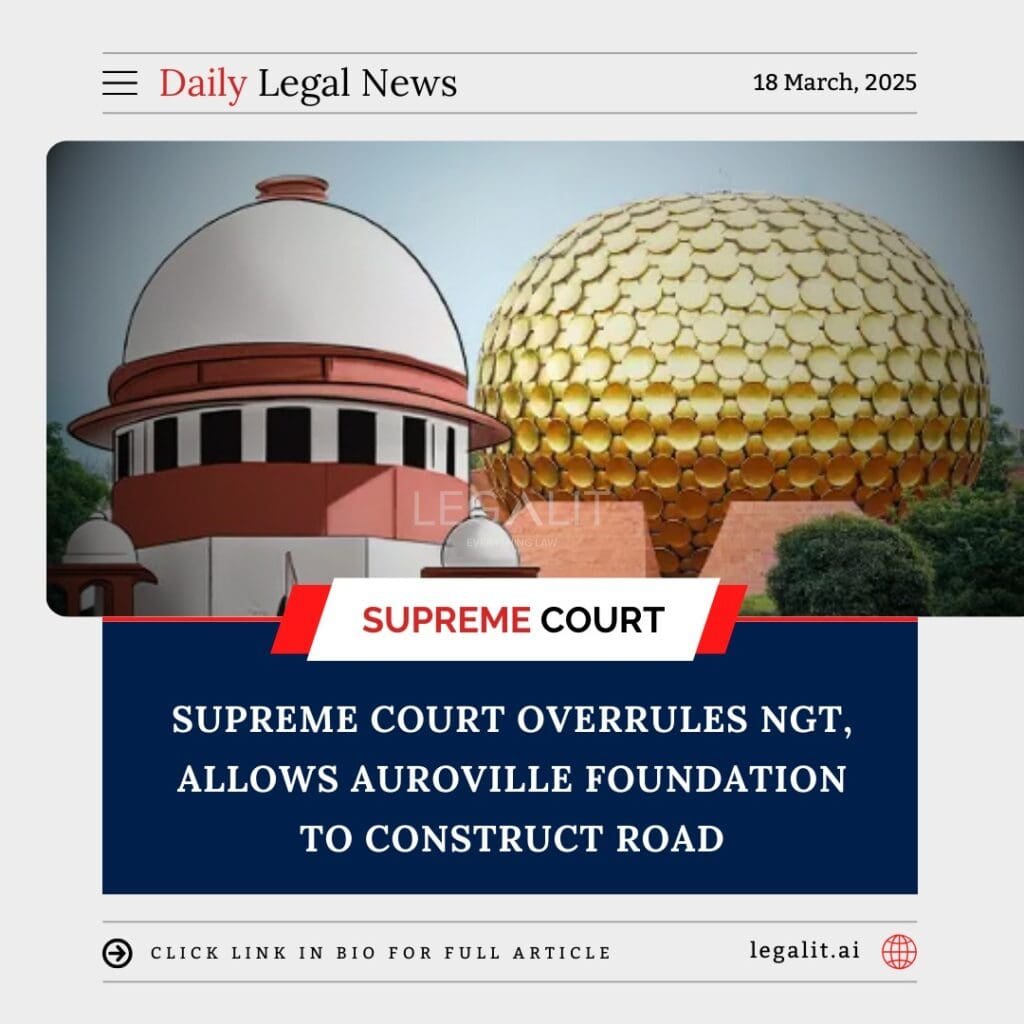
Background
The Supreme Court has overturned an order issued by the National Green Tribunal (NGT), thereby allowing the Auroville Foundation to proceed with the construction of a road within the township of Auroville in Tamil Nadu. The NGT had earlier directed a halt to the road construction, citing environmental concerns and alleged violations of ecological norms. The project had drawn criticism from environmental activists and local groups who argued that the construction would cause significant harm to Auroville’s Green Belt, an area known for its rich biodiversity and ecological significance.
The dispute arose when conservationists challenged the Auroville Foundation’s decision to proceed with infrastructure development in areas covered under the Auroville Master Plan. According to the petitioners, the construction of the road would lead to deforestation, disrupt natural water channels, and negatively impact the region’s flora and fauna. The NGT had subsequently intervened, issuing a directive to halt the project, citing the potential for environmental degradation. However, the Supreme Court, after reviewing the matter in detail, ruled that the NGT had overstepped its jurisdiction and failed to consider the larger legal and developmental framework governing the project.
Supreme Court’s Rationale for Overruling NGT
The Supreme Court, while setting aside the NGT’s order, emphasized the need to balance environmental concerns with planned urban development. The bench found that the project was legally sanctioned and complied with all relevant regulatory approvals. The following key points were considered by the court while arriving at its decision:
- Jurisdictional Overreach by the NGT
- The court observed that the NGT had acted beyond its legal authority by issuing an order to halt construction without substantive evidence proving that the project would cause irreparable harm to the environment. It noted that while the NGT has the power to intervene in environmental matters, such intervention must be supported by clear and valid legal grounds.
- Compliance with the Auroville Master Plan
- The Supreme Court examined the Auroville Master Plan, which governs the developmental activities in the township, and found that the proposed road was part of a broader infrastructure development initiative. The construction was not arbitrary but aligned with the urban planning framework designed to ensure both sustainability and accessibility.
- Need for Improved Infrastructure
- The court acknowledged that improved connectivity within Auroville was essential for the functioning of the township. It emphasized that infrastructural advancements should not be stalled solely on the basis of speculative environmental concerns, particularly when regulatory approvals are in place.
- Absence of Concrete Evidence of Environmental Damage
- The judgment pointed out that there was no conclusive evidence demonstrating that the construction of the road would lead to irreversible environmental damage. It also highlighted that development and conservation efforts must coexist rather than be positioned as opposing interests.
- Impact on Future Infrastructure Projects
- The court underscored that its ruling would set a precedent for future cases where developmental projects face resistance based on environmental concerns. It reiterated that while ecological protection is a priority, it cannot be used as an instrument to obstruct legally approved projects without valid grounds.
Implications of the Judgment
- For Auroville Foundation – The ruling grants the foundation the legal right to proceed with its infrastructure project, facilitating improved road connectivity within Auroville. This will enhance mobility for residents and visitors while supporting the township’s broader urban planning objectives.
- For Environmental Regulations – The decision reinforces the principle that environmental regulations should be applied judiciously and that interventions should be based on factual evidence rather than assumptions.
- For Future NGT Cases – The verdict serves as a reminder that the NGT must operate within its prescribed jurisdiction and that its decisions must be grounded in law rather than mere environmental concerns raised by activist groups.
Conclusion
The Supreme Court’s decision to overturn the NGT’s order highlights the importance of striking a balance between development and environmental sustainability. While acknowledging the significance of conservation efforts, the court clarified that regulatory authorities must not obstruct development without substantial legal justification. This ruling provides clarity on the scope of the NGT’s powers and sets a judicial precedent for similar disputes in the future. By allowing the Auroville Foundation to move forward with its road construction project, the court has reinforced the principle that legally sanctioned infrastructure developments must not be impeded without sound legal reasoning.